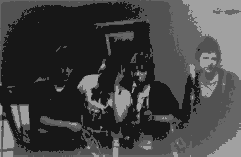
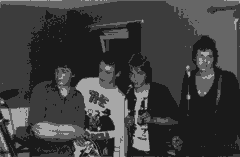
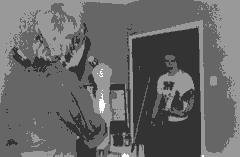
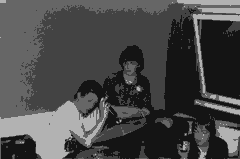
DOMESTIC BLISS
Domestic Bliss To Obscurity. I guess it all began for me with The Beatles, although my mother would probably tell you it was The Supremes. Apparently, I used to rock the pram to “Baby Love” on a regular basis (as attendees of my 30th B/Day bash will doubtless already know). Obviously, my preference for citing The Beatles over The Supremes is indicative of the rock snobbery that has blighted my existence on the planet, thus far. My earliest vinyl memory is a well-thumbed dog-eared family copy of “The Beatles Oldies But Goldies”. My Dancette bopped beyond the call of duty to those loveable mop-topped pop pioneers for many of my formative years. The advent of Glam Rock in the early 70s provided more suitably robust roll models in the shape of Slade, T-Rex & Sweet. We’d run from the last class before dinner to congregate around a transistor radio, eager for news of Slade’s latest No 1 chart entry. I loved Slade, one of the first proper LPs (as opposed to those amusing Top Of The Pops various impersonators LPs) I ever bought was “Old, New, Borrowed & Blue”. I also had a soft spot for a bit of Wings, especially “Red Rose Speedway”, an early Christmas token purchase. I also remember being unduly obsessed with “Layla” by Derek & The Dominoes – that guitar solo absolutely refused to leave my head for months one hot summer. As I grew older I was soon exposed to the notion of hip & began to take greater care & due consideration when selecting my idols. The first object of this kind of exclusive adoration was reserved for Status Quo, the archetypal “big brother’s” band. I can still remember forcing my family to watch them on TOTPs: “Look,” I exclaimed, “they can’t be miming. They’re tapping their feet - their leads are plugged into their amps - & the red light means the amps are on!!” Just goes to show how wrong a poor boy can be. Status Quo were soon eclipsed in the search for harder, more sophisticated sounds. I discovered Black Sabbath, Deep Purple, Rainbow, Led Zeppelin & (horror of horrors) Queen!!!! For a while back there, the sound track of my life was all sweet children in time, ladies who were sure that all that glittered was gold & killer queens. Oh yeah, & drum solos that went on for days. It was sometime around here that I first picked up my mother’s Spanish acoustic guitar & gingerly picked out the riff to “Smoke On The Water”. It didn’t stop there: within months I’d nailed down “Silver Machine”, “Rock & Roll, “Backwater” & several Richie Blackmore “licks”. To top it all I cancelled Motor Cycle News & Shoot & started reading Sounds. By the time 1976 arrived the music papers were filling our classroom with excitement & expectation. A new genre of music was setting the world alight – it was called PUNK ROCK. We read with wild-eyed enthusiasm of the heretical antics of the Sex Pistols, The Damned & The Clash. Compared to the dinosaurs we currently worshiped, these new whippersnappers came on like a bunch of retarded psychos: they were just what we’d been waiting for. One of the first PUNK records I bought was a compilation entitled “New Wave” on Sire Records. I immediately fell in love with The Ramones, The Voidoids & Patti Smith (whose “Piss Factory” was the most offensive record I’d ever heard in my life: I loved it). I remember buying The Jam’s “In The City” 45 & cutting the picture sleeve up to stick on my bedroom wall. Before long my wall was covered with pictures of Debbie Harry of Blondie, Gaye Advert & The Slits. I’d never considered music could be sexy before. Life in our leafy Warwickshire village was altered dramatically by PUNK ROCK. By late 1977, many young people had been infected by the new bug (much to the dismay & disgust of disco loving Norton Lindsay youth leader, Brian Parsons). The youth club decks were subjected to aural torture by 7” vinyl every Monday night. Graffiti & casual vandalism were on the up: the phone box & cricket club were robbed on a very regular basis to keep us all in fags, crisps, pop, stout & loose change. I dyed my hair blonde with some industrial bleach to celebrate the Queen’s silver jubilee. My parents were appalled, the village watched through twitching curtains whenever I walked passed. My reputation had been established: village arsehole. Darren Guy, John Henderson, Julian Morris, Rob Phipps & I would pass every evening listening to “Never Mind The Bollocks” repeatedly & smoking furiously. John, Darren & myself talked constantly about forming our own PUNK ROCK group. Before long I’d acquired an electric guitar, a very poor Gibson SG copy, & an amplifier: a very loud Marshall 100w top & a 4x12 speaker cab. I initially attempted to join an early incarnation of Flackoff (nee: The Lobsters) on second guitar along with Rod Goodwin, Mush Chimes (sadly no longer with us) & Pooch Purtle, but was sacked rather quickly for being “the worst guitar player they’d ever heard”. Hurt, embarrassed & just a tad annoyed, I soon decided to form my own band with Darren Guy & Olly Little. We began to practice at Darren’s house under the moniker, Damaged Rabbits (Body Stained Underpants & Obscene On TV were also considered). Olly’s reticence to actually sing into the microphone proved to be a major stumbling block, however, & after an impromptu performance at Norton Lindsay’s annual old folks dinner (we hit them with “Teenage Kicks”, “12XU”, “Action Time & Vision” & “Ex Lion Tamer”) – we felt legitimate for the very first time. Olly Little soon quit the group (though I have absolutely no idea why) & Darren I talked John Henderson into taking up the drums. We’d soon formed our first proper group: Domestic Bliss. John’s dad, the amazingly supportive & understanding Terrence Charles Henderson, agreed to let us set up base camp in his games room & our rehearsal rooms were sorted. We practiced 3 or 4 times a week, spurting out half formed songs & underdeveloped ideas like molten larva: “Child Battery”, “Vibrator On A Wall”, “Domestic Bliss”, “Life”, “Essential To Trivia” – before long we had a set, so we started gigging. Our version of “The Theme To Rupert The Bear” soon established itself as a live favourite & before we knew it we were supporting The Cravats & Fashion at Stratford College (akin to Wembley in our minds at the time). We honestly expected the UK tour supporting The Clash to kick in any day (although Darren would have probably preferred to support The Stranglers). By 1978, local entrepreneur & Wimpy lover, Bob Barnes, had ambitions to turn his successful independent record shop into a successful independent record label & was keen to make Domestic Bliss his first signing. We were ushered into WMRS & the arms of local producer, Johnny Rivers, to record 3 songs for our debut 45. Heady days, exciting times, shit songs. 1000 copies were pressed, sleeve art courtesy of local artist & group mate, Pip Williams. “Child Battery”/”Life” shifted 750 copies reasonably quickly. It was played on John Peel’s show 3 times! He told the nation we were from Naughty Lindsay!! The single garnered some enthusiastic support from local fanzines but was mauled in the singles page of The NME: “sub-song”, “Banshees rip off”, “hopeless” & “amateur” were just a few of the words chosen to describe Domestic Bliss. Listening to it again now I’m still fiercely proud of it: we were 16, it was 1978 & we were joining in the only way we knew how. Domestic Bliss were not the only Punk Rock outfit operating in the Leamington/Stratford axis. Leamington spawned The Shapes, School Meals & the aforementioned Flackoff. Stratford gave birth to The Fragiles. The Fragiles & Domestic Bliss developed what could best be described as a rivalry. I’m not sure it could be termed healthy: we eventually nicked their singer, Chris Jennings, & he joined Domestic Bliss on lead vocals in a hail of acrimony. The fallout from this ship jumping was still apparent months later when ex-Fragiles (then of Flackoff), John Archer & Mark Shorten, chose a Leamington Love Letter interview to declare how much they hated Simon Morgan (& that they’d once nicked one of his guitar leads) & how “crap” Domestic Bliss were. We just ignored them & Chris played his first & last gig with the group at our farewell show in a church hall at the end of Henley Street, Stratford (supported by The Varukers). Darren & I refused to let a little thing like failure come between us & by the end of 1979 we had reconvened as Flight 19 with Rob Phipps on drums & Mitch Wainwright on lead guitar. This line up was short lived (a handful of gigs & some truly awful demos), however, & Darren sensibly fucked off to Oxford to get a life & a career. For the first time in my short musical career, I was left holding the conceptual baby. Mitch, Rob & I recruited Chris Jennings on vocals & John Archer on bass & we reconvened as The Suspects (Mitch was eventually forced out of the band by some appallingly petulant shapes thrown by John, Chris & myself – sorry Mitch). The Suspects was a spookily relevant name for the group. We were, after all, a bunch of wasted miscreants who’d rather get paid in white (or brown!) powder for any gigs we did actually manage to pull off! The finalised line up featured myself on guitar, John Archer on bass, Rob Phipps (who to be fair, never took any drugs) on drums & Chris Jennings on vocals (for anyone who knew us at the time, we were not a pretty site!). We rehearsed at Mark Evan’s farm – below the dispensary! We eventually survived for a year or so – it’s unfair to say we got nowhere with this line up – we actually regressed further than we’d ever managed before!! In reality, we were as good a band as it’s possible to be on heroin. Chris & I were consumed by junk culture, & John found it almost impossible to strap on a bass without the aid of vast quantities of vodka. Rob Phipps, in the meantime, resolutely refused to develop a vice & consequently the only compliments we ever received as a group were always with regarded to the drums – funny that. Towards the end we had all the personal tragedy that affects many successful groups roped squarely around our necks, we were only lacking the success! We split up on a dark night all agreeing that it was best (but not before we’d played a gig on a Thames riverboat for a wedding party that made us all feel like the Pistols). My next musical adventure was to manage a group from Coventry called The Ramrods. We’d seen them at the Dragon in Stratford & they were easily the best local group we’d ever seen (including the Coventry Automatics). They had a tune called “Solidarity” that was an A1 killer. Perfect Punk-Pop. We got talking & I just offered to look out for them & try to move things forward. One of my first jobs as manager was to tell the current bass player he was sacked & to quickly learn my way around a bass. The Ramrods were all personally grooming themselves for imminent stardom: Danny Cunningham had already been in Squad, his brother Burzy in an early line up of Criminal Class & drummer Billy Danger WAS the coolest drummer I’d ever met. They had this torn denim thing going on & t-shirts with the arms ripped off. I got a big Mohawk cut & got out my Docs – we played some great gigs & had a real cool time, as they say. I loved that band – I thought I’d made it – they thought my bass playing sucked & I knew it did. After 12 months or so I bailed out to form my own all-new band: The Hop. The Hop was originally intended to be our vehicle to the stars – this was the big one – we were all convinced of that. The name was an obvious nod to Theatre Of Hate & a reference to the R&R classic of the same name. Chris Jennings & I talked the nights away, making plans & mentally spending the money. The Hop was really the coming together of two towns – Chris Jennings & Toby Chester representing Stratford, & myself & Jeff Welsby representing Leamington. Chris took care of vocal duties, Jeff plucked the bass, Toby handled lead guitar & I played second fiddle on my newly pick-up-ed Fender acoustic guitar (freshly purchased from Mark Gibbon’s of The Abstracts girlfriend, Liz). After a few rehearsals with Rob Phipps & then Paul Gardener covering on drums, we enlisted the help of local producer/drummer, Paul Johnson, & entered The Barn recording studios at Hatton to record our first demos. We laid down 2 tracks in that session, “All Fall Down” & “Paris To Dachau”, & were very pleased with the results. Chris remembers the producers name was Alex, I remember being really impressed with having a church bell on our track! Chris had always suffered from a lack of confidence in his vocal abilities, & it was no real surprise when he quit the group shortly after we’d recorded our best tune so far (“Broadcast” – recorded at Paul’s studio in his mom & dads back room - the vocal booth was the shower cubicle!): citing a sore throat that he just couldn’t shake! We quickly recruited my then flat mate, Dave Tibbetts, & re-entered The Barn to record 2 further songs, “I Will Cry” & “Come All You Young Heroes”. No one was happy with the results, especially Dave who hated the vocals with a passion. It was decided that I take control of the lead vocal duties & we recruited Simon “Ginge” Gilbert of Dead To The World on drums. We rehearsed sporadically in a newly converted barn “studio” complex near Borden Hill on the Evesham Road, Stratford. We began to rehearse in earnest in a seedy, freezing basement across the road from my seedy, freezing flat in Regents Place, Leamington Spa. We were surprisingly prolific & amassed a completely new set within a matter of weeks. We were soon gigging: The Cork & Fork in Leamington, The Green Dragon in Stratford, & shows as far away as Banbury, Hereford, Stafford & London. Over an 18 month period we established ourselves as one of the region’s leading groups & played support to Ken Livingston, Under Two Flags, The 3 Johns & The Photos. We recorded several demo tapes, appeared on a flexi disc with a local fanzine, organised two major festivals & even made it to the quarter finals of a battle of the bands competition before losing out in Birmingham on a rainy night in 1984. At some stage, I can’t remember when, we were contacted by a Mike Hendry who claimed to represent EMI Records. He wanted us to change our image & name to The Glory Boys & play at being pop stars – we declined (the wisdom of this decision is still debatable). The eventual loss of lead guitarist, Toby Chester, was overcome by the recruitment of Les Reid & Becky (can’t remember her surname) on tenor & alto sax, respectively. This incarnation recorded The Hop’s finest hour in the shape of “Back To Work”, our track on the Rhythm Recording Studios Compilation LP, “The Rhythm Method”. By this stage we had begun to jump through hoops in an attempt to hone a sound that was entirely our own. Had we stuck to our guns & battled it out, God knows where we could have ended up. As it was we battled on bravely to a final gig in Leicester that rocked the house but left us all broke, depressed & disillusioned with the world of rock & roll. I left The Hop the following week. It was 1985 & I had to get a job – as usual in these kind of circumstances, I returned to the security of our family business & my destiny: electrical contractor! I also scored a job writing for The Voice (a London music paper): I was engaged as their Hip Hop correspondent. Over the next 18 months I interviewed Public Enemy, Tim Westwood, The She Rockers (Betty Boo!!), “Evil” Eddie Richards & rap crew, The Syndicate. In line with all my previous experience of working in the music industry, I failed to get paid, published or recognised. I was in a rut – it was 1988. Around this time I was approached by my sister, Lindsey, to write some songs together & gig as an acoustic folk duo. We made our debut in Redditch later that year & by 1989 had won the Radio 1 Young Band Of The Year Competition on the Mark Goodyear programme. We were presented with £5,000’s worth of Yamaha Vouchers & a management contract with Bananarama’s manager, Hillary Shaw. Thinking back now, this is when I should have walked away. We signed to WEA publishing for £30,000 & proceeded to recorded several LP’s worth of material with Bob Lamb (UB40’s producer), met several top line producers with a view to recording our debut LP, recorded a BBC session at Pebble Mill, played industry showcases in Leicester Square & at Ronnie Scott’s, supported Bliss on a national tour, recruited a group that included name musicians (two of whom, again – spookily - are sadly no longer with us), turned down a whole host of perfectly good recording contracts & split up in a hail of recrimination & debt. I was left with a £7,000 tax demand. Shell-shocked & a tad bitter, I sank into the search for the perfect groove. I began messing about with dance beats for 18 months or so, recording several “dance anthems” with my little sister Kate, & the redoubtable & far too talented Dick Decent. All attempts sank without so much as a ripple. By 1991, the lure of the stage had reared its ugly head again: I’d met a lad called Tony Sherridan & we’d begun writing acoustically in my front room in Whitnash. Within weeks we’d found a bass player (Ian), a keyboard payer (Mike Leddy) & the (by now) quintessential Rob Phipps on drums. In a whirlwind of activity we recorded, gigged & built a sizeable fan-base around Leamington Spa. To be honest, however, I was not really enjoying things too much. I was rapidly approaching 30 & beginning to feel rock & roll was an immature, over-rated & highly unsuccessful way to get paid. We played our final gig together in front of a packed house at Leamington’s Pump Rooms It was a great set – I gave it my all: throwing my best guitar hero shapes, playing with courage & conviction & briefly kidding myself that this wasn’t the end after all. I say briefly, I quit the band as we loaded the van. I’d sold my amp & electric guitar within days – as far as I was concerned – rock & roll & me were through – Elvis had indeed left the building. Until the next time – don’t touch that smile.




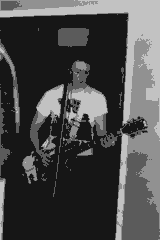
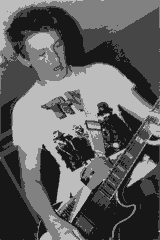
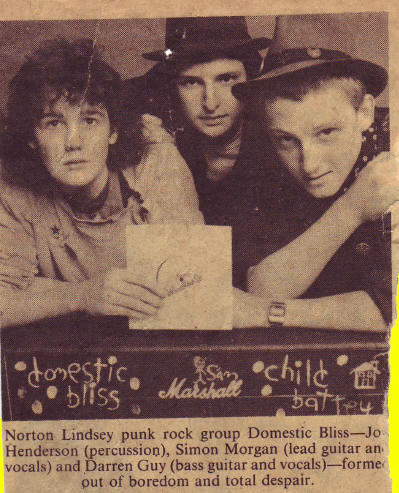
Simon Morgan – Nov – 2002
©Detour Records